Papers by Stephan Pühringer

Economists occupy leading positions in many different sectors, including central and private bank... more Economists occupy leading positions in many different sectors, including central and private banks, multinational corporations, the state and the media, as well as serve as policy consultants on everything from health to the environment and security. Power and Influence of Economists explores the interconnected relationship between power, knowledge and influence which has led economics to be both a source and beneficiary of widespread power and influence. The contributors to this book explore the complex and diverse methods and channels that economists have used to exert and expand their influence from different disciplinary and national perspectives. Four different analytical views on the role of power and economics are taken: first, the role of economic expert discourses as power devices for the formation of influential expertise; second, the logics and modalities of governmentality that produce power/knowledge apparatuses between science and society; third, economists as involved in networks between academia, politics and the media; and fourth, economics considered as a social field, including questions of legitimacy and unequal relations between economists based on the accumulation of various capitals. The volume includes case studies on a variety of national configurations of economics, such as the US,
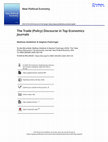
Research Papers in Economics, Jul 1, 2019
In the aftermath of recent populist upheavals in Europe, nationalist economic policies challenge ... more In the aftermath of recent populist upheavals in Europe, nationalist economic policies challenge the overly positive view on economic integration and the reduction of trade barriers established by standard economic theory. For quite a long time the great majority of economists supported trade liberalisation policies, at least those actively engaged in policy advice or public debates. In this paper, we examine the elite economics discourse on trade policies during the last 20 years regarding specific characteristics of authors, affiliations, citation patterns, the overall attitude towards trade, as well as the methodological approach applied in these papers. Our analysis yields the following results: First, the hierarchical structure of economics also manifests in the debate about trade. Second, while we found some indications of a shift towards more empirically oriented work, quite often empirical data is solely used to calibrate models rather than to challenge potentially biased theoretical assumptions. Third, top economic discourses on trade are predominantly characterised by a normative bias in favour of tradeliberalisation-policies. Forth, we found that other-than-economic impacts and implications of trade policies (political, social and cultural as well as environmental issues) to a great extent either remain unmentioned or are rationalised by means of pure economic criteria. KEYWORDS Trade evaluation; trade policies; 'empirical turn'; social studies of economics; bibliometric analysis; top economic journals JEL CODES A12; A14; B41; F10 It has long been an unspoken rule of public engagement for economists that they should champion trade and not dwell too much on the fine print. (Rodrik 2018
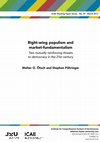
Research Papers in Economics, Mar 1, 2017
The article compares market fundamentalism and right-wing populism on the basis of its core patte... more The article compares market fundamentalism and right-wing populism on the basis of its core patterns of thinking and reasoning. Based on an analysis of the work of important founders of market fundamental economic thinking and the arguments brought forward by leading right-wing populist we find many similarities of these two concepts in their "inner images". Thus, we develop a scheme of the similar dual social worlds of right-wing-populism and market fundamentalism and offer some recent examples of market fundamentalism and right-wing populism mutually reinforcing each other or serving as a gateway for each other. We then apply our scheme for the analysis of the recent political developments and its ideological roots in the US under Donald Trump. The main conclusion of this article is that market fundamentalism and right-wing populism together must be seen as two mutually reinforcing threats to democracy in the 21st century.
Social Science Research Network, Mar 14, 2020

Power and Influence of Economists, 2021
During the last decades there was a long-lasting debate among economists and other social scienti... more During the last decades there was a long-lasting debate among economists and other social scientists on the question to what extent economic thought has an impact on the course of (economic) policy-making as well as on the society in general (Christensen, 2017; Fourcade, 2009; Hall, 1989; Hirschman & Berman, 2014). Hence, particularly economists active in policy advice and public discourses stress the (long-term) influence of economic thought and thus partly even develop strategies to maximize their impact. As early as in 1936, Keynes in the "General Theory" famously stressed the importance of economic ideas, at least in the long run: "The ideas of economists and political philosophers. .. are more powerful than is commonly understood. Indeed the world is ruled by little else" (Keynes, 1936, p. 383). And yet in the beginning of the 21st century Larry Summers (2000, p. 1), due to his roles as U.S. Secretary of Treasury under Clinton and later as director of the National Economic Council under Obama, arguably one of the politically most influential economists during the last decades, stresses, "(W)hat economists think, say, and do has profound implications for the lives of literally billions of their fellow citizens". In contrast to these considerations, within the German economic debate, around the year 2000 several economists bemoaned a decline of political and societal influence of academic economics, partly due to ignorant politicians and public authorities, partly also due to an alleged problematic development of the economics discipline, that is, a sole focus on methodological rigor to the disadvantage of political relevance (Franz, 2000; Frey, 2000b). One possible solution to overcome the perceived impotence of economic advisors was brought forward by the then president of the German Institute for Economic Research (DIW Berlin) Klaus Zimmermann. Zimmermann (2004, p. 401) remarked, "Given that European and German policy-makers are hesitant to proactively seek advice, the media channel is of central importance. In my view it is the silver bullet of policy advice". He further argued that he requests the DIW department heads to participate actively in public debates and the media. The question whether and to what extent economics as a scientific discipline as well as distinct economists have a political and societal impact is still
SSRN Electronic Journal, 2020
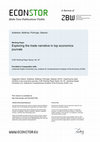
In the aftermath of recent populist upheavals in Europe, the U.S., the UK and other areas around ... more In the aftermath of recent populist upheavals in Europe, the U.S., the UK and other areas around the world, nationalist economic policies challenge the overly positive view on economic integration and the reduction of trade barriers established by standard economic theory. For quite a long time the great majority of economists supported trade liberalization policies, at least those, who were actively engaged in policy advice or public debates. Yet it was hardly investigated whether this general support emerges from a consensus view among economists on this issue or whether only a partisan interpretation of economic expertise is used to serve a distinct political purpose. Against this background, in this paper we examine the elite economics discourse on trade and trade policies by applying a multilevel mixedmethod approach. In doing so we combine quantitative methods with a discourse analytical approach in order to examine dominant narratives and imaginaries present in high impact papers dealing with trade, globalization and related policy issues. Our analysis yields the following results: First, the hierarchical structure of economics is also present in the economic debate on trade. Second, the top economic discourse on trade is predominantly characterized by a normative bias in favor of trade liberalization policies leading to a systematically underestimation of negative effects of free trade policies. Third, we found that other-thaneconomic impacts and implications (political, social and cultural as well as environmental issues) of trade policies either remain unmentioned or are rationalized by means of pure economic criteria. To sum up, we conclude that the narrow perspective present in top economics discourse on trade prevents a more comprehensive understanding of the multifaceted gains and challenges related to the issue of international integration.
The central subject of this study is a comparative analysis of the current state as well as devel... more The central subject of this study is a comparative analysis of the current state as well as development trends in German and US economics, to check the thesis of a German special path. Therefore we conducted an empirical analysis of full professors of economics in the countries chosen. The main focus of our analysis is on their publications in economic journals (research profile) as well as on their scientific and political connections (policy making). The data collection was realized through a multilevel survey, which consists of qualitative and quantitative variables. A main result of the study is that while the research profile (e.g. the paradigmatic orientation) of economists in the two countries is fairly similar, differences potentially indicating a special path of German economics can be found on the level of politico-economic networks in economic policy advice.

As an immediate reaction to the recent financial crisis, it has been criticized that many economi... more As an immediate reaction to the recent financial crisis, it has been criticized that many economists are still acting as economic advisers for Ministries or the bureaucracy, although they have not been able to foresee the crisis . Academic economists still hold central positions in policy making; they influence decisions in economic expert panels or research departments in national and supranational organizations. Beside their role as policy advisors, economists also engage in public debates in a more narrow sense as technical economic experts as well as in a broader sense as 'public intellectuals' in the process of the transmission of economic knowledge in public (economic) policy discourses. In spite of the manifold critique about the state of economics in the aftermath of the crisis, an even increasing presence of economists and economic experts can be observed in the pu blic sphere during the last years . On the one hand this reflects the still dominant position of econo...

Economic Anthropology eJournal, 2021
This paper discusses the actual relevance and historical origins or ‘competition universalism’. I... more This paper discusses the actual relevance and historical origins or ‘competition universalism’. In economics, competition is conceptualized as a nearly ubiquitous element of societies, or, at least, used to study a wide array of social and political relations, including competition between firms for market shares, between individuals for prestige, countries for resources, athletes for victory, or politicians for influence. This trend towards ‘competition universalism’ was facilitated by the increasing dominance of an economic approach that places less weight on descriptive accuracy and a consideration so socio-historical specificities, but instead focuses on the development of general and tractable mathematical models. Thereby, the paper links the trend to competition universalism to developments in the epistemological orientation in economics. It first explicates the historical genesis of competition universalism, then discusses the extent it has reached today, and concludes with c...

Eine Annaeherung an den Begriff der Solidaritaet ist aus vielen Gruenden ein schwieriges Unterfan... more Eine Annaeherung an den Begriff der Solidaritaet ist aus vielen Gruenden ein schwieriges Unterfangen. Kreisky (1999:41) unterststellt dem Begriff "Schluepfrigkeit" und auch Dallinger (2009:21) konstatiert in ihrer Analyse der Solidaritaet in modernen Gesellschaften, dass die mangelnde Klarheit des Konzepts zu beklagen sei. Wie viele der zentralen Begriffe des politischen Diskurses scheint auch Solidaritaet kaum greifbar und in einem stetigen Spannungsverhaeltnis zwischen verschiedensten Deutungsmustern und Ideologien. Im modernen Sprachgebrauch wird er inflationaer verwendet und durch seine semantische Unbestimmtheit und seinen ungeklaerten theoretischen Status laeuft er Gefahr zu einer leeren Worthuelse zu werden. Daher ist es fuer die Bestimmung der Potenziale eines emanzipatorischen Solidaritaetsverstaendnisses zunaechst wichtig zu klaeren, welche Form der Solidaritaet man meint. Ohne sich zu sehr in den Bereich der theoretischen Bestimmung der etymologischen Wurzeln de...

Comparative Political Economy: Regulation eJournal, 2020
This paper introduces a framework to facilitate an interdisciplinary analysis of 'competition... more This paper introduces a framework to facilitate an interdisciplinary analysis of 'competition'. While such an interdisciplinary analysis can be justified by referencing the various fields of social and economic life in which 'competition' is important, three challenges are found to aggravate such endeavor. To mitigate these challenges, and to explicate the often implicit meta-theoretical assumption in the scope, methodological and normative dimension, a meta-theoretical framework is proposed. Its usefulness is illustrated via a comparative description of selected contributions from the social sciences and humanities. Despite its limited scope, it yields some preliminary conjectures that may inspire future research: first, there are sufficient common elements across different concepts of competition that justify an interdisciplinary approach to study competition; second, apart from differences between disciplines, there are remarkable differences within disciplines th...
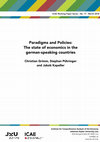
This paper studies the research interests, paradigmatic orientation and political orientation of ... more This paper studies the research interests, paradigmatic orientation and political orientation of about 700 full professors of economics at universities located in German-speaking countries. In doing so, we captured biographical and institutional information on these professorships by collecting data from personal and professional websites as well as publicly available CVs to derive indicators on the research orientation, the paradigmatic stance and the political involvement. The main contribution of this paper, hence, is empirical in nature. It documents the fairly homogenous paradigmatic stance of German-speaking academic economics, as criticized in recent debates on pluralism in economics, but also identifies venues of change within the existing paradigmatic setup. Furthermore, we show that a big share of German economists, active in economic policy advice bodies have institutional connections to the ordoliberal research program. This politico-ideological conjunction thus provides...

Unmittelbar nach der Finanz- und Wirtschaftskrise 2008ff. schienen auf politischer, wissenschaftl... more Unmittelbar nach der Finanz- und Wirtschaftskrise 2008ff. schienen auf politischer, wissenschaftlicher wie auch medialer Ebene die Zeichen guenstig fuer tiefergreifende gesellschaftliche Wandlungen und eine Abkehr von neoliberalen wirtschaftspolitischen Konzeptionen. Sechs Jahre nach dem Ausbruch der Krise scheint indes zumindest auf EU-Ebene neoliberal orientierte Wirtschaftspolitik dominanter denn je zu sein. Es kann vielmehr auf mehreren Ebenen, trotz wiedersprechender empirischer Evidenz ein "Befremdliches Ueberleben des Neoliberalismus", wie Crouch (2011) es nennt, konstatiert werden. Diesem Befund folgend wird in diesem Beitrag der Frage nachgegangen, wie es vor allem im deutschsprachigen Raum so schnell gelingen konnte, eine Debatte ueber die systemischen Ursachen, sowie deren wirtschaftstheoretische und wirtschaftspolitischen Implikationen zu verhindern und sehr schnell zu einer austeritaeren Nach-Krisenpolitik uebergehen zu koennen

Die Finanz- und Wirtschaftskrise ab 2007 kann als Krise der oekonomischen Theorie verstanden werd... more Die Finanz- und Wirtschaftskrise ab 2007 kann als Krise der oekonomischen Theorie verstanden werden. Der fast vollstaendige Zusammenbruch des Interbankenmarktes und vieler Finanzmaerkte und dann der tiefe Einbruch der globalen Realwirtschaft kollidiert mit der immer noch vorherrschenden Sichtweise, Maerkte (und die gesamte Wirtschaft) wuerden sich im Prinzip selbst stabilisieren und Krisen seien demnach als "aussergewoehnliche Ereignisse" (Puehringer und Hirte 2015) zu interpretieren, die nichts an der grundsaetzlichen Verfasstheit des Wirtschaftssystems aendern wuerden. Dies gab Anlass, die Beziehungen von oekonomischen Theorien zur Wirtschaft, zur Politik und zur Gesellschaft (u. a. zu den Medien) neu zu hinterfragen. Dabei ist es notwendig, OekonomInnen nicht nur als "objektive" BetrachterInnen einer von ihnen unabhaengigen wirtschaftlichen "Realitaet" aufzufassen, sondern als AkteurInnen, die mit vielen gesellschaftlichen Bereichen in starker Wechse...
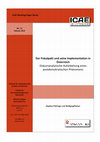
Aus der Sicht der Politikwissenschaft sind der Fiskalpakt an sich, und auch seine Implementation ... more Aus der Sicht der Politikwissenschaft sind der Fiskalpakt an sich, und auch seine Implementation ein weiteres Phaenomen der bereits seit laengerer Zeit zu konstatierenden postdemokratischen Tendenzen (Crouch 2008, 2011; Bluehdorn 2006; Joerke 2005, 2011) innerhalb der EU und deren Mitgliedstaaten, wie etwa auch schon das Europaeische Semester oder die "EU-Sixpack"-Massnahmen. Intransparente Entscheidungen, wo zwar versucht wird, nach aussen hin den Schein eines rechtmaessigen Instanzenzuges und eines demokratiepolitisch einwandfreien Verfahrens zu wahren, werden hinter verschlossenen Tueren getroffen und mittels "Sachzwang-Argumentation" begruendet. Der Fiskalpakt, der weitreichende Folgen und Eingriffe in die nationalstaatlichen Budgethoheiten und Haushaltsrechte hat, wurde von den Staats- und Regierungschefs der EU innerhalb von nur zwei Monaten ausverhandelt und ein Monat spaeter beschlossen (Oberndorfer 2012). Die Aushebelung demokratischer Kontrollinstanzen,...

Research Papers in Economics, 2013
Die gegenwaertige Wirtschaftskrise hat zu Beginn 2007 zu einer Welle der Kritik an oekonomischen ... more Die gegenwaertige Wirtschaftskrise hat zu Beginn 2007 zu einer Welle der Kritik an oekonomischen Expertisen gefuehrt. Fuer einen kurzen Zeitraum - Krugman bezeichnete dies auch als "keynesian moment" - schien eine wirtschaftspolitische Neuorientierung moeglich. Einige anerkannte OekonomInnen uebten sich in Selbstkritik ueber die Konsequenzen wirtschaftspolitischer Konzepte, die durch zu hohe Abstraktionsniveaus die Sicht auf potenzielle Finanzmarktkrisen verhinderten. Im Laufe der Krisenpolitik in der Europaeischen Union hat sich allerdings gezeigt, dass - entgegen anfaenglichen Beteuerungen - die Krise nicht als Krise der Finanzmaerkte oder gar des kapitalistischen Wirtschaftssystems interpretiert wurde. Vielmehr kam es zu einer Umdeutung der Finanzkrise in eine Staatsschuldenkrise und neoliberale Austeritaetsprogramme waren die logische Konsequenz. Dieser Beitrag entstand auf Grundlage einer Studie im Auftrag des Jubilaeumsfonds der oesterreichischen Nationalbank, in der...
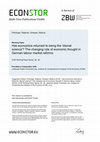
As an immediate reaction to the recent financial crisis, it has been criticized that many economi... more As an immediate reaction to the recent financial crisis, it has been criticized that many economists are still acting as economic advisers for Ministries or the bureaucracy, although they have not been able to foresee the crisis . Academic economists still hold central positions in policy making; they influence decisions in economic expert panels or research departments in national and supranational organizations. Beside their role as policy advisors, economists also engage in public debates in a more narrow sense as technical economic experts as well as in a broader sense as "public intellectuals" in the process of the tra nsmission of economic knowledge in public (economic) policy discourses. In spite of the manifold critique about the state of economics in the aftermath of the crisis, an even increasing presence of economists and economic experts can be observed in the pu blic sphere during the last years . On the one hand this reflects the still dominant position of ec...










Uploads
Papers by Stephan Pühringer